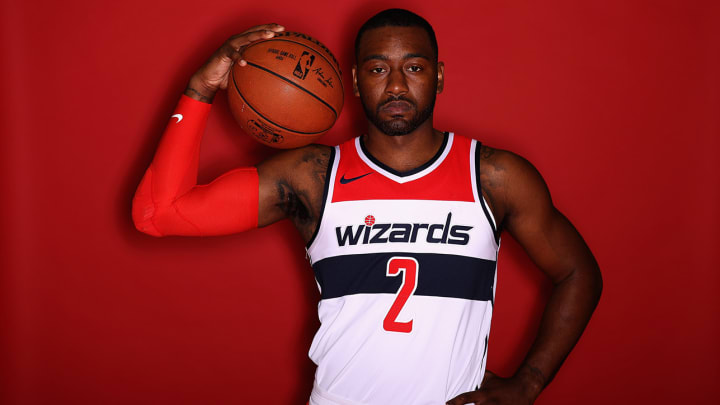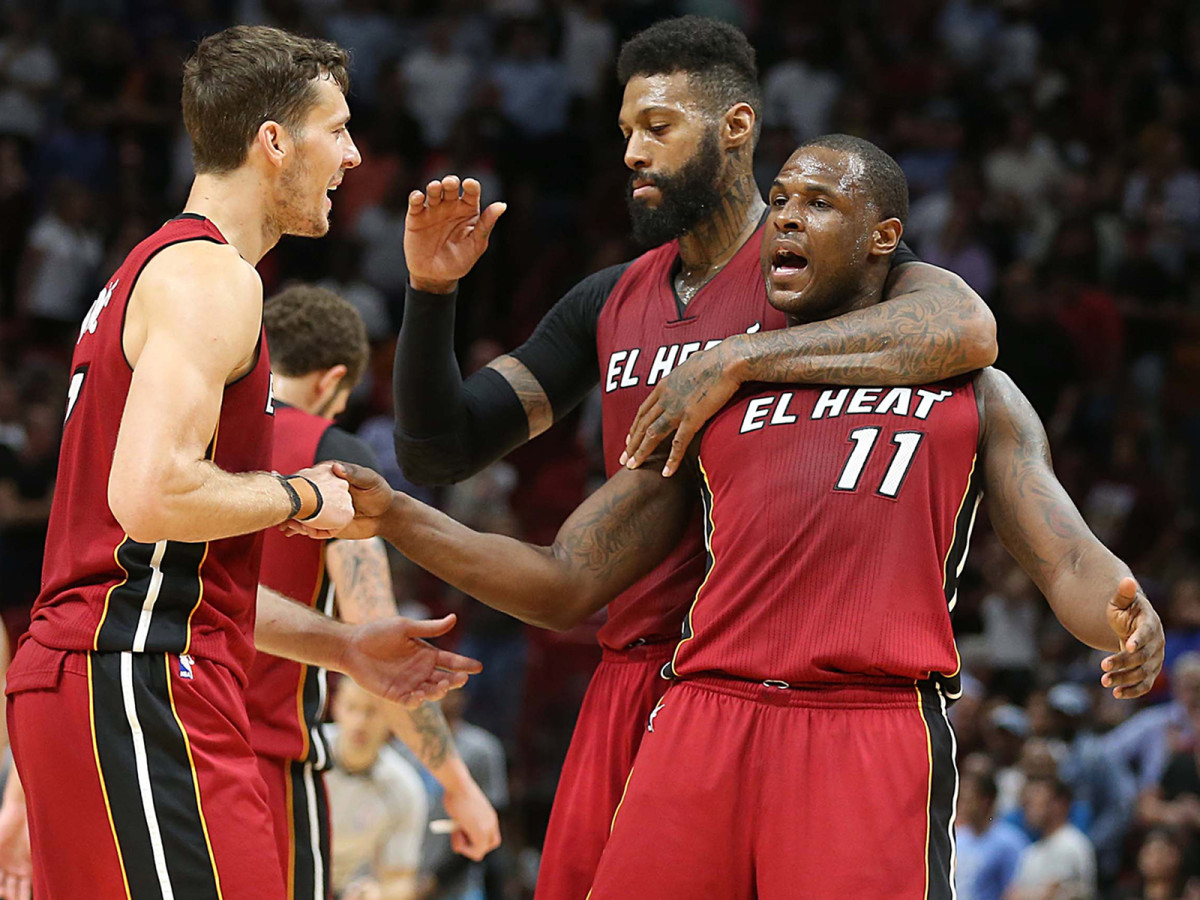Will John Wall and the Wizards Take the Next Step?

The full basketball life cycle is on display in the Southeast division. You’ll find a team that won 60 games just three seasons ago stripped down for a complete rebuild; a lottery regular lost in search of its identity; an overachieving cast looking to replicate the remarkable; a playoff-caliber group ready to prove itself; and a contending hopeful looking for every possible avenue into the conference’s top tier. What that lacks in intra-division drama it makes up for in diversity.
The NBA cannot help but be a balanced ecosystem, as the fates of every team are linked to the same finite pool of proven franchise players and high draft picks. As one team wins, another must lose. So it goes in the Southeast, where no two teams are quite in the same place. What makes for a successful season is unique to the evolutionary stage of the team involved.

Atlanta Hawks
Outlook: The Hawks didn’t choose to rebuild as much as the rebuild chose them. Al Horford, whom Atlanta thought they could retain, bolted in free agency last summer. Their only chance of keeping Paul Millsap from doing the same was to roll out a rich offer for the 32-year-old—a decision that would leave the Hawks with little room for improvement on their 43-win season. So off went Millsap and Tim Hardaway Jr. and Dwight Howard and Thabo Sefolosha and Mike Dunleavy and Jose Calderon.
The new Hawks were remade in the spirit of short-term contracts and readily available fliers. The final roster—MacGyvered around holdovers Dennis Schöder, Kent Bazemore, Taurean Prince, and Ersan Ilyasova—is as underwhelming as one might expect. Losing is the unavoidable next step. Unfortunately for the Hawks, the NBA just passed a lottery reform package that both makes it harder for bad teams to position themselves for the No. 1 overall pick and guarantees even less than before in terms of how far a losing team’s pick might drop in the draft order.
Best case: Several of the fledgling Hawks prove themselves as contributors worthy of a winning rotation, all while the team loses enough games to secure the top lottery odds for next year’s draft.
Worst case: Somehow win enough games this season to not finish with one of the league’s three worst records. A team only gets so many shots at being this bad. Atlanta has to make it count.
Charlotte Hornets
Outlook: Charlotte’s 2016-17 season completely unraveled when Cody Zeller, the team’s unassuming center, went down with a midseason shoulder injury. In response, the Hornets shored up their center rotation to the point that Zeller is now the backup. Enter Dwight Howard, whose rebounding and interior defense should solidify much of what the Hornets do well. You’d be hard-pressed to find a bigger advocate for Howard than coach Steve Clifford; the two have now worked together as part of three different organizations, meaning that Clifford knows well the way Howard can change a game and the way Howard can half-ass his way through one. The Hornets are banking on Clifford’s ability to steer Howard toward the former, harnessing the best of his play for a competitive, professional outfit.
Kemba Walker has become the kind of dependable lead guard who can set the table every night with his scoring and playmaking. Between Nicolas Batum, Marvin Williams, and Michael Kidd-Gilchrist, Charlotte has length and versatility enough to cover the floor while Howard hangs back in the paint. It remains to be seen whether the Hornets can muster enough scoring to hang with the more prolific offenses in the league, but their consistently high level of execution and stout team defense will keep them competitive in the vast majority of regular season games. Charlotte might not be a contender, but they’re still an opponent to be reckoned with.
Best case: Clifford awakens Howard to his new reality, further punctuating the polished play of one of the best-prepared teams in the league.
Worst case: A weak bench (particularly in the backcourt) and shaky spacing undercut Charlotte’s best efforts throughout the season, pushing them to the playoff fringes. Howard sulks.
Miami Heat
Outlook: Buried beneath the Heat’s feel-good resurgence in the back half of last season was the sobering, offsetting reality of its first half. The only reason Miami didn’t make the playoffs—a goal that was up in the air until the final night of their season—was because they started their campaign so pitifully. It is natural, from a narrative sense, to view the Heat’s dramatic arc as a sort of progress. Yet somewhere in this team is the proven potential to lose 30 of 41 games, just as it has shown it can win 30 of the next 41. That range makes Miami one of the toughest teams in the league to pin down, especially now that two of its more erratic contributors (Dion Waiters and James Johnson) now have the security of a big payday.
One way or another, Miami needs its fire. Some players found that last season in the pressure of a contract year, while others rallied behind their own motivations. Erik Spoelstra will have his work cut out for him in again finding that unifying spark. There are good players here, but none so good that the Heat could get by with anything less than complete team investment.
Best case: The playoff-bound Heat continue on their Gestalt streak in proving their whole, complete roster superior to the sum of its parts.
Worst case: Miami’s huge financial investment in preserving their roster immediately turns sour, and the magic of last season is gone.
Orlando Magic
Outlook: The seasons roll on for the Magic, who appear no further along now than they were three years ago. There are more prospects in the pipeline than ever before, though none of them pop. Aaron Gordon has yet to make good on his wide-ranging potential. Elfrid Payton has steadily improved, albeit not in the ways Orlando might prefer. Evan Fournier can clearly score, but to what end? The lack of any singular talent on the roster has left the Magic without much sense of structure.
They’re searching, and in their search have turned to veterans on the younger side of their playing prime who might help offer some stability. Jonathon Simmons and Terrence Ross, both acquired over the last year, are the kinds of professionals who make sense for a team stuck in neutral: groomed through winning programs, broadly useful, and talented enough to explode on the right night. Now all Orlando needs is one of its lottery picks (perhaps newcomer Jonathan Isaac?) to finally pay off on the promise of their draft position.
Best case: The Magic emerge from the season with a clear understanding of which players on its roster are worth building around and which are not.
Worst case: Another season comes and goes without meaningful development from Orlando’s core prospects. Something has to give.
Washington Wizards
Outlook: While most of the Southeast is plotting to sneak into the playoff picture, the Wizards are planning out their matchups against the best in the conference. There’s enough here to give teams like Cleveland and Boston a real series, due in large part to John Wall. The best guard in the East plays for Washington. He is the sort of full-court dynamo that breaks a defense before it can fully set. His cross-court playmaking—a crucial skill in unlocking a team’s shooters—makes use of angles that other guards wouldn’t even consider. Any team with Bradley Beal, Otto Porter, and Marcin Gortat could be competitive, but it’s through Wall that the Wizards assume their feisty, ambitious persona.
The great unknown with Washington, as always, is whether their bench can hold up its end of the bargain. A healthier season from Ian Mahinmi could go a long way in stabilizing the Wizards’ second unit, but an outsized responsibility will fall on the shoulders of Kelly Oubre, Tomas Satoransky, Tim Frazier, and Mike Scott. It’s there that Washington may find its ceiling.
Best case: Internal development and improved bench play push the Wizards to the Eastern Conference finals.
Worst case: Washington’s core proves to be in need of more help than its gridlocked finances would allow.
Breakout player: Justise Winslow, Heat
Absent from the Heat’s rollicking good times last season was Winslow, whose season was cut short by shoulder surgery. His return only further diversifies one of the league’s most interesting rosters. Miami will have its options at both forward spots, but none that defend quite like Winslow—a physical, lanky obstruction who could stand in the way of some of the league’s most impressive scorers.
To justify siphoning minutes away from last season’s regulars, however, Winslow will have to prove some greater value to the offense. That may come with improved perimeter shooting, a stated goal of Winslow’s first two seasons. It could come through continued expansion of his ball-handling, which Miami experimented with before his injury last season. Or it could come through some unforeseen quirk in rejoining a team that, in many ways, moved on without him. Winslow is a player of material importance to the future of the Heat. He’s also resourceful enough to find his way amid changing circumstances, no matter how the team’s roles or operations turn.
Rookie to watch: Malik Monk, Hornets
Polarizing views of Monk’s game from NBA scouts only add to the intrigue: While some are completely sold on Monk as a dynamite scorer, others don’t see his skill set translating against professional competition at all. Charlotte could desperately use the kind of player Monk optimists project. As such, one can expect he’ll find every opportunity to play this season as the Hornets search for options at both the 1 and the 2, both areas of particular need. Charlotte is both one perimeter piece away from solidifying its playoff standing and one Kemba Walker injury away from falling out of the mix entirely. Monk, theoretically, could help in both regards.
Coach on the hot seat: Frank Vogel, Magic
Scott Brooks and Erik Spoelstra have too much good will after their relative successes last season to be in any trouble. Steve Clifford has the respect and buy-in of his organization. Mike Budenholzer will lead a team with zero expectations for the season. That leaves Vogel, whose Magic were a mess last season, with the hottest seat by default. Front office changes—like those that installed Jeff Weltman and John Hammond—are rarely good news for a recently hired coach. New executives come in with their own ideas of how a team should be run and their own preferences in terms of which coaches they like to work with. There’s no specific rumbling of any rift between Vogel and the front office as of yet, but if the team continues on pace for another sub-30 win season, Vogel could unfortunately become the next fall guy in Orlando’s eternal rebuild.
Random bold prediction
The Hornets snag a top-four seed in the East while Dwight Howard makes his first All-Defensive team since 2012.
